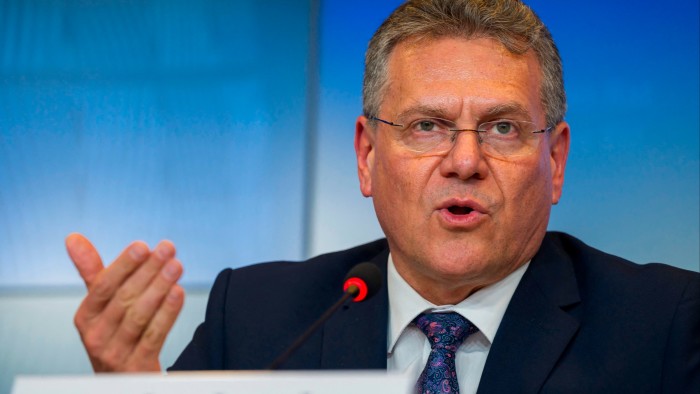Good morning. Today, our trade correspondent reports on talks on retaliation options against the US should negotiations over Donald Trump’s tariffs fail to reach a deal, and our Berlin bureau chief previews tomorrow’s crucial vote on forming a German coalition.
We’re taking a break over the May 1 bank holiday. Ben Hall will be in your inboxes on Saturday, and we will be back next week
Have a great long weekend.
To do list
After three weeks of fruitless talks on a deal to remove US trade tariffs, the EU is stepping up plans to hit back if necessary, writes Andy Bounds.
Context: US President Donald Trump levied so-called “reciprocal” tariffs on most of the world on April 2, hitting the EU with a rate of 20 per cent. But then Trump reduced them to 10 per cent a week later, giving partners 90 days to make concessions to remove some of them.
Previously, the US had already hit the bloc with sectoral tariffs of 25 per cent on steel and aluminium and cars, which remain in place. Officials say the US has yet to give clear indications of what measures could persuade Trump to drop them — and keep him from raising the “reciprocal” tariffs again.
The European Commission, which runs trade policy, is now planning in case of failure. Member state ambassadors will be briefed this evening on the next steps for a possible retaliation, four diplomats told the Financial Times.
They cannot take phones into the room, now standard for any discussion of US relations.
Diplomats expect a broad discussion about when and how hard to retaliate, with the focus for now on hitting a fresh list of goods, rather than services such as Big Tech platforms. EU tariffs on €21bn of US goods including Harley-Davidson motorcycles, poultry and clothes have been paused until July 14.
One diplomat said the commission would likely present a broad plan of action, since trade ministers meet again on May 15. “It’s a debriefing and the way forward,” said another.
The main aim is to preserve unity by keeping a balance between more hawkish member states that want to retaliate, and those that want to prioritise talks, diplomats said.
Trade commissioner Maroš Šefčovič has held meetings with US commerce secretary Howard Lutnick, while economy chief Valdis Dombrovskis met Treasury secretary Scott Bessent last week. But before Easter, Šefčovič briefed ambassadors that the tariffs were unlikely to be fully lifted, and it was unclear whether the US side wanted to ease them at all.
Ambassadors will also discuss the effect of cuts to USAID, and the EU’s 15 per cent minimum corporate tax, which has been criticised by the US. A senior official said there would be no imminent change to the tax.
Chart du jour: ‘Make Romania Great Again’
Five months after Romania’s presidential vote was annulled due to alleged Russian meddling, a Maga-style ultranationalist has a comfortable lead in opinion polls.
Big reveal
Is Germany’s chancellor-in-waiting Friedrich Merz getting ahead of himself?
The leader of the Christian Democrats (CDU) could not wait for a crucial Social Democratic (SPD) vote, nor for the Bundestag to elect him to the chancellery, to announce his party’s cabinet line-up on Monday, writes Anne-Sylvaine Chassany.
Context: Merz’s only viable coalition partner, the SPD, is today releasing the outcome of a two-week members’ electronic vote on the government agreement.
In Berlin, the assumption is that a majority of the 358,000 SPD members will back the deal, paving the way for Merz to be elected chancellor on May 6. But there is no plan B if the vote fails.
The SPD leadership is hoping that members will appreciate the chance of staying in power after February’s stinging electoral defeat, as well as reward its co-leaders Lars Klingbeil and Saskia Esken for successfully negotiating a €500bn infrastructure fund and bagging top ministries such as defence and finance.
They also count on their faithful’s sense of responsibility: a no would force both parties back to the drawing board amid huge geopolitical and economic challenges.
Without a stable majority, Merz could be forced to lead a minority government, having ruled out teaming up with the far-right Alternative for Germany (AfD), the second-biggest political force in parliament. This would plunge Europe’s largest economy into great uncertainty.
But the SPD is far from a happy party.
Klingbeil and Esken face criticism for not drawing the lessons of its worst electoral result since 1887. The SPD youth wing, Jusos, has said it would reject the coalition deal due to immigration, social and tax policies.
Despite his eagerness to get started, Merz will probably hold his breath this morning, when the SPD treasurer retrieves the members’ ballots.
What to watch today
-
European Commission president Ursula von der Leyen and other leaders and officials participate in the 2025 European People’s party congress.
Now read these
-
‘Millions of flies in the evidence room’: Take a tour inside Belgium’s rotting Justice Palace, an apt symbol of the country’s crumbling legal system.
-
Life after sanctions: Commodity traders, insurers and shipping groups are approaching lawyers for advice on how to restart trading with Russia.
-
Not for sale: The EU’s top court yesterday ruled that Malta’s citizenship-for-investment scheme violates EU law.
Are you enjoying Europe Express? Sign up here to have it delivered straight to your inbox every workday at 7am CET and on Saturdays at noon CET. Do tell us what you think, we love to hear from you: europe.express@ft.com. Keep up with the latest European stories @FT Europe









